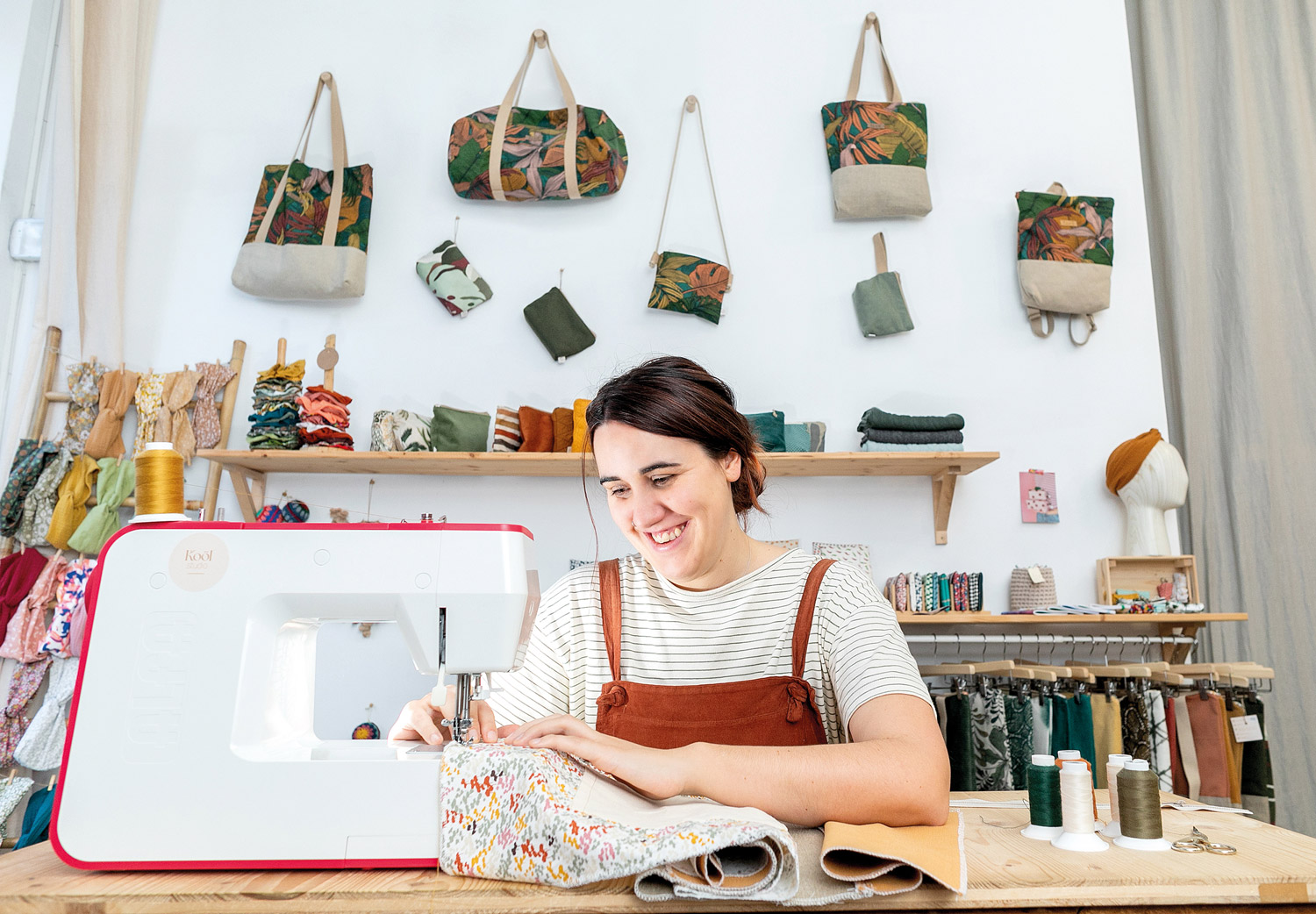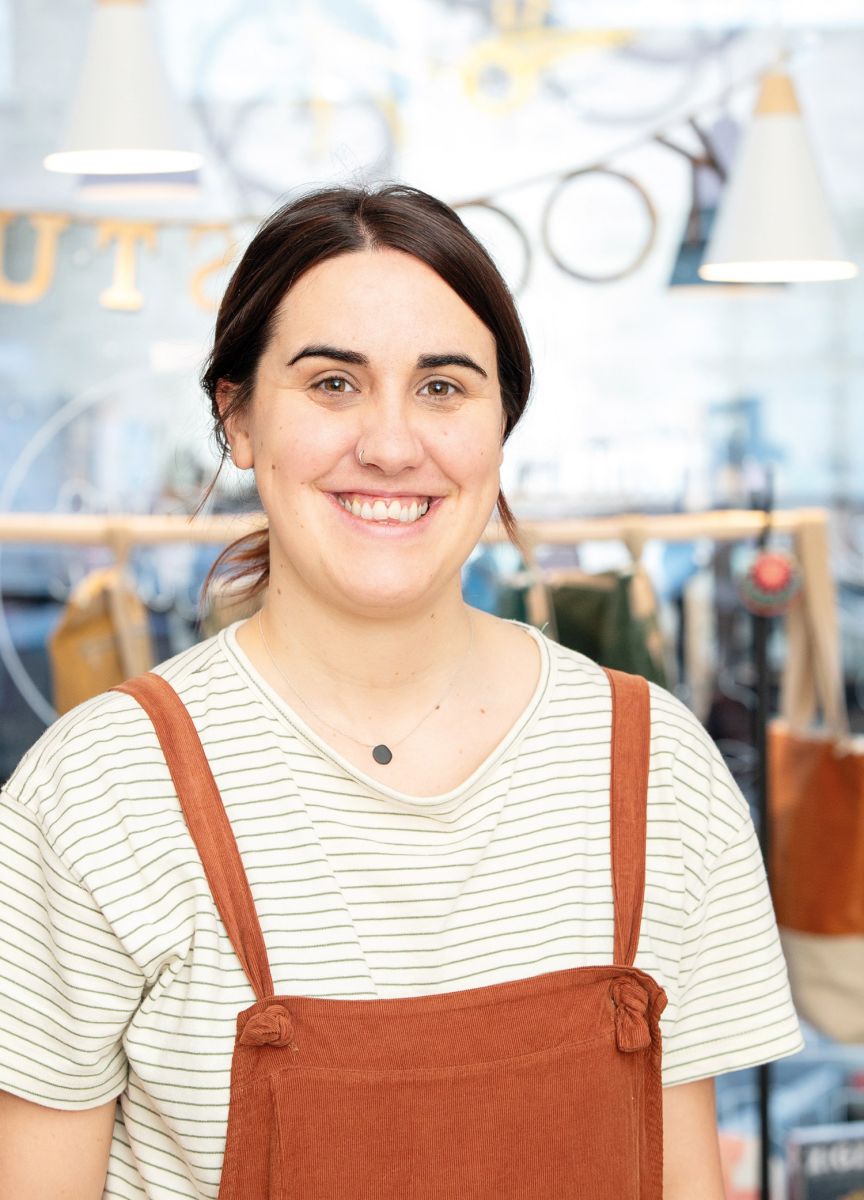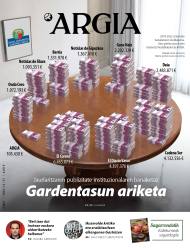“We are not competitors but fellow travellers”
- Salsamen studied textile design in Barcelona (Catalonia). However, it has never coincided with the values of fast and cheap fashion. He went home to continue studying. He learned to sew, went to Madrid (Spanish state) to practice sustainability. What had to be a month count ended up lasting two years. And back home. This time to stop. But not to stand still. Because Salsamendi lives in motion. Full movement in Koöl. That's how he's taken it to us, back at a cafe, next to the sewing machine, looking at us.

“Gure markarekin sortzen duguna, patxadaz eta proba asko eginda aukeraturiko materialarekin egiten dugu. Euskal Herrian erosten dugu ahal dugun gehiena, bertako kontsumoa sustatu nahi dugulako eta jasangarritasuna kontuan hartu nahi dugulako. Beraz, atzerrian erosten badugu, hemen ez dagoelako da. Horri guztiari prezioa jartzea oso ariketa zaila da, jakin badakigulako ez direla egunero erostekoak, bai ordea denboran iraun eginen dutela. Kontsumo azkarraren zirkulutik ateratzeak baditu ondorio batzuk, eta horiek prezioan ikusten dira. Iruditzen zait Euskak Herrian kontzientzia sortzen hasiak garela eta emaitzak jasotzen hasiak gara”.
Koöl Studio comes from the Cool life model.
In Euskera, and we wanted a name that matched that life model. We came up with no complications. My mother and I easily agreed. When I finished my studies, we traveled to Uganda to do a cooperation project. I have previously lived in Barcelona and Madrid, studying or working.
This time I wanted something familiar, close, and as far as possible local. At the same time, environmentally friendly, sustainable. In identifying and defining all these values, I have been helped by the residents before the implementation of the project. I wanted the one who gets in here to be calm, to feel in a cool environment, without feeling compelled to consume. I wanted to create an environment that invites to be, to look, to study. I've realized that Koöl Studio is the result of the process that I've done and that I've lived.
It is a living result.
No doubt. It's a very vivid project. We are more than just a store. We started seven years ago, and since we opened the store, it's barely three years. We needed a bigger place, and besides denying the workshop, it seemed nice to me to be able to sell what I had created. I manufacture bags, cases, for hairs, etc. Behind each product is a journey, eleven tests, dozens of movements. We also sell products from other creative women, behind which there is a lot of effort. We want to gradually change the consumption model, and that requires movement.

The static doesn't fly.
I think so. Koöl Studio works for a sustainable consumption model. As soon as I opened, I contacted a number of creative women. I told them the project and they were encouraged to put their products here for sale. We're now about 30. We would like us to take the habit of buying what we need and not because we're dragged into fashion. Thinking that they are cheap, we buy a number of items, put them in the closet or in the drawer and then leave them there. In a responsible and minimalist model of consumption, the quality of the product is addressed. He wonders why that and not the other. Life is another model, and it is possible.
Does change come? Do you notice anything?
Something is changing. In very small spaces and at a slow pace, but I think so. No laps yet, unfortunately. In Euskal Herria, there are many creators and more and more these spaces. I would also say that this comes from the hand of women, many of whom are changing their pattern of consumption are women. Perhaps thanks to the feminist awareness or awareness of the work of its creation. Most of the clients here are women and at trade fairs the potential buyer is also a woman.
You're in Lasarte, but not in the city center. You have to come here.
Yes, and we wanted it from the very beginning. If we're in the center of the city, we'd have more visibility, it's true. There could be more people, but surely not to buy. Three years ago we opened the doors, and I think many lasartarras still don't know us. But what you've come and bought usually comes back. They come to look for a special gift or a particular product, and we really help us to have a quiet relationship with the cliente.Para a project of this kind, I would say the location is favorable, and it has also allowed
me to combine shop and workshop. It works from fraternity.
I didn't want to work alone, and I knew I wanted to work with women, in a quiet work model, getting to know each other and respecting each other. Not feeling alone in the face of problems is of great help. In short, we are all faced with very similar obstacles. And maybe, despite creating the same thing, all the results are different. We are not competitors, we are fellow travellers.
In addition, Izan Inurri, an association for monitoring people with cancer, was born in Lasarte and we started the road together. We have cooperated from the start. I've offered them space for what they need and work for them. Networking with them has had a major impact on our project. I am very grateful.
And my mother --
my mother has helped me from the beginning. Both in stitching and in the process of opening the workshop. We are both one in this project.
They say the witches are combed... But what do you do with your comb, polish or straighten your hair? For both the Bruja Comb (Dipsacus fullonum) is alagala. Straighten hair from top to bottom, lift it from bottom to top. The authentic comb is the dried fruit of the witch comb... [+]
Izerditako baten irudia zabaldu du H&M multinazioanalak. Irudian haur beltzaran bat ageri da “Ohianeko tximurik guayena” idatzia soinean duela.




















